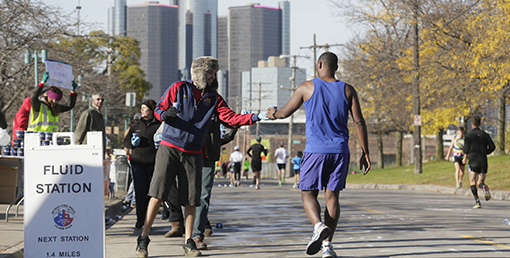Absopure
(un)Filtered

How to Prevent and Manage Fall Allergies
You may have made it through summer without getting sick, but as the season shifts, fall brings its own set of challenges for your immune system. In many regions of the United States, allergy season begins in late August and may persist into October. Knowing how to prevent and manage fall allergies can help you stay healthy and enjoy the season instead of struggling with symptoms.
Allergic rhinitis, commonly known as hay fever, affects over 60 million Americans annually. It’s what happens when pollen or another allergen enters your body and your immune system recognizes it as a danger. Hay fever can induce sneezing, a runny nose, watery eyes, and congestion. A smart strategy and other safety measures can lessen unpleasant allergy flare-ups, allowing you to enjoy the fall season to the fullest.
Fall Allergy Triggers
Mold spores are a common fall allergy trigger. They can form in the fall when leaves pile up and soil becomes moist. An example that happens inside the home is when basements and bathrooms have poor ventilation, and are susceptible to growing mold. Exposure to mold can exacerbate allergies and asthma by remaining in the air cycled in enclosed spaces. It’s recommended to keep the humidity in your house as low as possible and to keep the air circulating to prevent mold.
One of the most common allergens to blame is ragweed pollen, which can travel hundreds of miles and stay in the air for days. As temperatures begin to drop, and we close windows, other allergens like dust mites and pet dander become issues when heating systems are in use, and air is recirculating throughout the home. This problem becomes exacerbated when heating systems are in use and are recirculating air throughout the home.
Symptoms to Watch For
Symptoms of fall allergies can be frustrating, and that’s especially true if they’re disrupting your daily life. These can include a runny or stuffy nose, itchy, watery eyes, and sneezing. One of the most complained-about symptoms is fatigue, likely due to poor sleep from nighttime congestion and postnasal drip.
How to Prevent Fall Allergies
Preventing fall allergies starts with minimizing exposure to the allergens that trigger them. Staying inside is recommended during high pollen periods, and avoiding touching your eyes while outside can help reduce exposure. When doing activities like raking leaves or gardening, wearing sunglasses can help to keep pollen out of your eyes. A mask can also help reduce the number of allergens that are inhaled.
Showering and changing clothes after being outside can help reduce indoor contamination. Another prevention tool is regular cleaning. Using a vacuum with a HEPA filter, dusting with a damp cloth to reduce airborne allergens, and washing bedding in hot water on a weekly basis help get rid of any dust mites.
Managing indoor humidity is also important. It’s suggested to keep humidity between 30-50% to help prevent both mold and dust mite growth.
Managing Fall Allergies Effectively
Preventative approaches for fall allergies may not work for everyone, so managing symptoms may be your best option. Over-the-counter antihistamines can help with sneezing and itching. Nasal corticosteroid sprays can reduce inflammation in the nasal passages. For those with more persistent symptoms, allergy shots can offer long-term relief. These can be very helpful for people who are responsive to the treatment; however, it may take about 6 months to a year for symptoms to noticeably improve.
Hydration is an often-overlooked approach for managing allergies. Staying hydrated helps transport and deliver nutrients to the cells, maintains and controls body temperature, supports the overall function of organs, and even prevents infections to a certain extent. Water helps maintain healthy mucous membranes, which are critical in defending against allergens.
Keeping a reliable source of water on hand, such as Absopure All Natural Spring Water, can make it easier to stay consistently hydrated throughout the day.
Making the Most of Fall
Dealing with fall allergies can be frustrating; however, they don’t have to keep you from enjoying everything the season has to offer. By reducing both indoor and outdoor triggers and prioritizing hydration, you can stay ahead of symptoms and breathe easier.
One of the simplest and most effective ways to support your body during allergy season is to drink plenty of water. Choosing a trusted source like Absopure ensures you’re providing your body with the hydration it needs to keep mucous membranes healthy, flush out irritants, and better manage allergy symptoms. With the right preventive strategies in place, combined with the added support of consistent hydration, you’ll be well-prepared to prevent and manage fall allergies all season long.





